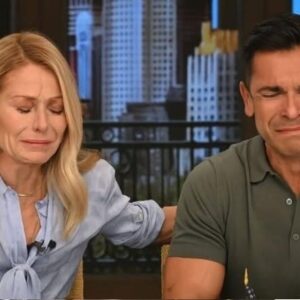She sat quietly near the corner, clutching a tattered purse in her lap.
Her coat was far too thin for the weather, her shoes scuffed and mismatched.
The hospital waiting room was full, and most people gave her a wide berth — out of judgment, and some out of discomfort.
One woman leaned over to her husband and whispered, “She must be lost.
She probably wandered in from the street.”
He chuckled.
“She’s waiting for free coffee, not a patient.”
A group of well-dressed family members glanced at her, rolled their eyes, and laughed under their breath every time she shifted or reached into her bag.
One nurse even gently asked, “Ma’am, are you sure you’re in the right place?”
“Yes, dear,” she said softly.
“I’m exactly where I need to be.”
An hour passed.
Then two.
Still, she waited.
Finally, the double doors swung open and a man in full surgical gear walked out, scanning the room.
He looked exhausted — mask down, hair messy from the scrub cap — and headed directly toward the old woman.
Everyone stared.
He stopped in front of her, eyes softening.
Then he said, loud enough for the whole room to hear:
“Are you ready to tell them who you are now?”
The room went still.
The woman lifted her head slowly, blinking up at him.
Her lips trembled slightly, but there was a steady quality in her gaze.
“I suppose it’s time,” she murmured.
The surgeon reached down, taking her hand with surprising tenderness.
She stood, her back a little crooked, but her steps sure.
All the people who had mocked her moments ago now stared in stunned silence.
The nurse who had questioned her earlier looked away, flustered.
The surgeon turned to the crowd, clearing his throat.
“This woman,” he said, “is the reason I’m standing here today.”
Gasps scattered through the room
“My name is Dr. Sebastian Creighton.
I completed a fourteen-hour surgery.
A triple bypass on a man who would have died without it.
The reason I could perform that — the reason I became a surgeon — is because of her.”
He nodded toward the woman, who now stood with quiet pride in her eyes.
“Her name is Margaret.
She is not an ordinary old lady.
She is the woman who raised me when no one else would.
She worked two cleaning jobs to pay for my school supplies.
She skipped meals so I could eat.
When I told her I wanted to be a doctor, she said, ‘Then be the best doctor you can.’”
Margaret’s eyes shimmered, but she didn’t cry.
“I never knew my real parents,” Dr. Creighton continued.
“I was placed at a shelter when I was three.
Margaret volunteered there part-time.
She looked at me and said, ‘I believe this one is mine now.’”
The room had fallen completely silent.
“She adopted me with no money, no help.
Only heart.
Today she waited five hours here because I requested to see her after my surgery.
Not for an emergency.
Simply to hug her.
Because I promised I’d always make time for the woman who never gave up on me.”
He turned and pulled her into a long, quiet embrace.
His shoulders visibly trembled.
Someone in the waiting room began to clap.
Then another.
Soon, the entire room stood, applauding.
Margaret looked around, confused.
“Why are they clapping?” she whispered to him.
“Because, Mom,” he smiled, “you deserve recognition.”
After the moment passed and the room settled, Margaret sat back down beside him.
The nurse who had earlier doubted her brought her a warm cup of tea, her hands shaking slightly.
“I’m very sorry, ma’am,” she said.
Margaret simply smiled.
“That’s alright, dear.
Sometimes people only perceive what is superficial.
I have done it too.”
She sipped her tea, her hands still trembling slightly from age.
One of the women who had mocked her earlier approached cautiously.
She looked embarrassed, her designer bag clutched awkwardly to her chest.
“I didn’t know,” she mumbled.
“I assumed… well…”
“It’s alright,” Margaret said again.
“We all make assumptions.”
But the surgeon glanced at her.
“That does not make it right.”
The woman nodded, her cheeks reddening.
“No, it does not.”
Margaret leaned back, resting her head against the wall, and smiled.
“It’s humorous, you know.





